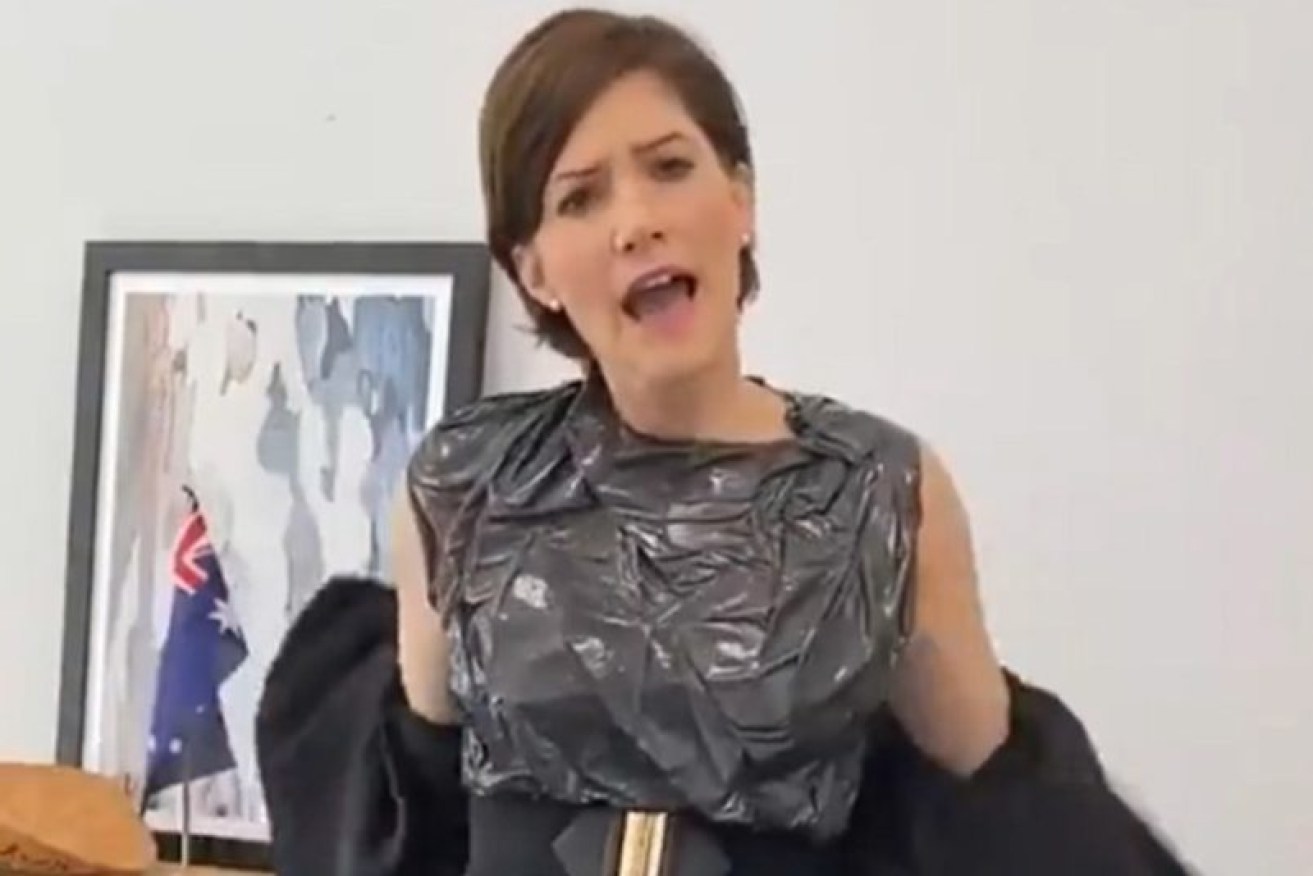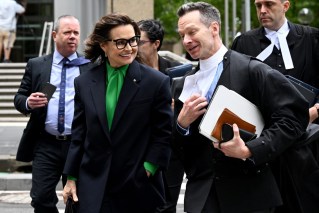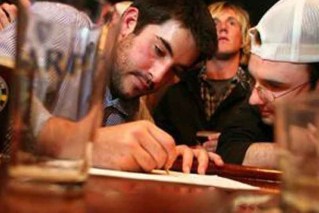The politics of fashion: Will female leaders ever be able to dump power dressing?
Do we rate the policy or the shoes? Judging women in power by what they wear is actually getting worse, writes Katrina Beikoff


Nicolle Flint made a powerful address to Parliament about sexual harassment. (Photo: Supplied)
A bit of trash talk in politics is par for the course.
But this week, Australia’s female politicians have again had to call out the double standard of being judged by what they wear, not just the job they’re doing.
It prompted federal MP Nicolle Flint to don a bin bag to make a stand against “rubbish” criticism of her over her wardrobe.
On Twitter on Monday, the South Australian wrapped herself in a garbage bag dress, and demanded: “What should a woman in politics wear?”
“I’ve put up with a lot as a woman in politics,” Flint said in her post that has been viewed more than 250,000 times in three days.
She then went on to respond to a newspaper column in Adelaide’s Sunday Mail, which pilloried her outfits of choice including ankle-freezing trousers, coloured jackets and stiletto heels.
So, just what should a woman wear, she asked as she slid off a coat to reveal a belted grey plastic bin bag over tight ankle-freezer black pants and stilettos. “How about a garbage bag? To match your rubbish views.”
Amid the outpouring of support for Flint’s attack on sexism, female politicians from all sides of politics at state and federal level called for an end to the “gendered nonsense” and “to judge the policy, not the shoes.”
Sick of sexist garbage?
I am, which is why I’m calling out @abcadelaide’s Peter Goers rubbish views about my appearance, published in yesterday's @theTiser Sunday Mail.
It’s time women in public life are judged on what they stand for, not what they look like. #GarbagelikeGoers pic.twitter.com/tk9DRyM0nN
— Nicolle Flint (@NicolleFlint) July 27, 2020
But the judgements on a woman’s ability to do her job based on what she wears was unlikely to get better any time soon, according to Dr Denise N Rall, a Southern Cross University Adjunct Research Fellow and commissioning editor of a soon to be released book called Fashion, Women and Power: The Politics of Dress.
The book, which contains 10 academic essays commissioned by Rall, investigates women in powerful positions in Australia, New Zealand, the UK, the United States and Asia and how they are judged on their fashion choices.
“What we found is that there are various forces at play that determine what women have to wear, and they are going to be judged on that whether they are effective leaders or not,” Rall said.
“Long story short, women in politics are caught between do I look like a female goddess or do I wear trousers like a man. Those are the two options, especially in the social media age, and you’re consistently judged on what you wear. We don’t do that to men.”
Rall said social media was making the issue worse.
“We tried to work out how women can escape this double bind where if you dress like a woman you can’t do the job, or if you dress like a man, you’ve lost your femininity. There’s not a lot of room in the middle there.
“Things have gone backwards because of social media. I think they’ve intensified. Social media is part of visual culture and it’s very, very hard to escape.”
In response to Flint’s Twitter missive, Queensland’s federal MP for the South Brisbane electorate of Lilley, Anika Wells, described what female politicians asked of their outfits daily.
“Be authentic but appeal widely. Be charming but don’t try too hard. Put together, but not like you spent much time on it. Made up but not like you care so much. Confident, but modest ya know? I’m with @NicolleFlint, the standards expected of women politicians are garbage,” she wrote on Twitter.
Be authentic but appeal widely. Be charming but don’t try too hard. Put together, but not like you spent much time on it. Made up but not like you care so much. Confident, but modest ya know? I’m with @NicolleFlint, the standards expected of women politicians are garbage #auspol
— Anika Wells MP (@AnikaWells) July 27, 2020
But even women don’t always give other women a break. Rall said while having to deal with what their clothes said about their ability to do their job applied to all women in power, it was also women who judged.
In front-page comments, that many considered to have backfired, Queensland LNP leader Deb Frecklington recently tried to stake out differences between the two women leading their parties to the October state election by taking a swipe at the Premier calling her “Princess Palaszczuk” for wearing designer clothes.
In criticising Annastacia Palaszczuk’s image and fashion choices, Frecklington claimed she was more “grounded” than the Premier.
Rall said insinuating a leader had certain traits based on clothing and style was an old trick in the catwalk of political fashion.
Hillary Clinton was targeted for the clothes she wore, as was Australia’s first female prime minister Julia Gillard, she said.
“There was a dress for success movement in the 1970s when women adopted the business pants suit as they climbed the corporate ladder, but it backfired. Former first lady Hillary Clinton wore the wrath of the right-wing media labelling her fashion as masculine.”
And Gillard, who discussed the sexism and judgments of her clothing in her book Women and Leadership: Real Lives and Real Lessons released last month, a decade after taking the prime ministership, was relentlessly targeted for her fashion choices, Rall said.
She said those who hoped the Gillard experience was a turning point in the way female leaders were judged, were likely to be disappointed.
“Men have the uniform, they have the suit, it’s been part of the zeitgeist since the 1920s and nobody judges them for it.
“But for women, it’s just gone off the rails. Maybe now more than ever women’s political efficacy and authority can be reduced by this concentration on what they wear.”

This article is supported by the Judith Neilson Institute for Journalism and Ideas












